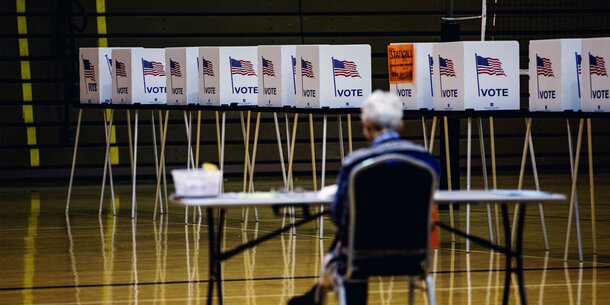In Republican National Committee, et al. v. Benson, et al., the Republican National Committee (RNC) and two Michigan voters sued the Michigan Secretary of State and Elections Director alleging that most counties in the state have voter registration rates that are too high and therefore the Secretary and Elections Director must purge the rolls more aggressively. On April 4, 2024, the League of Women Voters of Michigan requested permission to intervene as a defendant, represented by the Brennan Center and Paul, Weiss, Rifkind, Wharton & Garrison LLP and Pinsky Smith. On October 22, 2024, the court dismissed plaintiffs’ complaint and denied the pending motions to intervene as moot. On September 25, 2025, the 6th Circuit Court of Appeals affirmed the dismissal.
Background
The National Voter Registration Act of 1993 (NVRA) was enacted to increase voter participation and protect our elections. Under the NVRA, election administrators are required to conduct reasonable voter list maintenance that includes safeguards to ensure eligible voters are not accidentally removed from the rolls. Such safeguards include the requirement that systematic list maintenance not be conducted within 90 days of an election; that list maintenance programs be reasonable, uniform, and nondiscriminatory; and that voters be removed due to suspected change of address only after they are sent a notice that they are going to be removed, fail to respond, and fail to vote in two consecutive federal elections.
Voter list maintenance – when done responsibly – is appropriate and necessary for election administration. But removing voters without adequate protections violates federal law and can lead to disenfranchisement. When voter purges are rushed, based on unreliable data, or done without essential precautions or enough public notice, voters bear the greatest burden – potentially arriving at the polls only to discover they have been removed from the rolls and are unable to cast an ordinary ballot.
On March 13, 2024, the RNC and two Michigan voters initiated a lawsuit against Michigan’s Secretary of State and Elections Director alleging that they have not maintained accurate voter rolls.
On April 4, 2024, the League of Women Voters of Michigan requested permission to intervene in the case. The League argues that plaintiffs seek to apply an unreasonable standard for voter list maintenance, jurisdictions should not be required to purge voters based on unsubstantiated and unsolicited data provided by third parties, and eligible voters will likely be removed from the rolls if the state complies with plaintiffs’ request.
On October 22, 2024, the court dismissed plaintiffs’ complaint because they lacked standing and because plaintiffs did not show that they were entitled to relief. The court also dismissed pending motions to intervene as moot. On September 25, 2025, the 6th Circuit Court of Appeals affirmed the dismissal.
Context
This case follows on a multi-year, national effort by activist groups using exaggerated claims to pressure jurisdictions around the country to use aggressive purge practices. The allegations are almost identical to two cases from 2020 in which the Michigan League of Women Voters, represented by the Brennan Center and Paul, Weiss, successfully intervened. In the first, the Public Interest Legal Foundation (PILF) alleged that the city of Detroit was failing to purge voters aggressively enough. After our intervention, PILF dropped the case. In the second, Anthony Daunt – an activist backed by the conservative Honest Elections Project – claimed the state and 16 counties were not purging voters aggressively enough. Again, plaintiff dismissed his case after we intervened.
In 2021, PILF brought a separate suit alleging that Michigan was failing to purge its rolls of dead voters. A federal court dismissed the case on March 1, 2024, finding the state’s list maintenance satisfied federal law; PILF has since appealed.
Michigan is not the only state seeing these types of lawsuits. The RNC brought a substantially similar case to this one in Nevada and is reportedly plotting an aggressive litigation strategy ahead of the 2024 general election. Election denier groups called Maryland Election Integrity and United Sovereign Americans, meanwhile, have filed a suit asking for aggressive purges and questioning other legitimate methods of election administration in Maryland. United Sovereign Americans is allegedly planning to bring “many suits” across the country.

